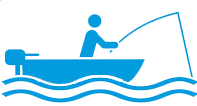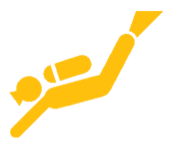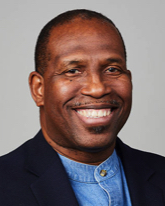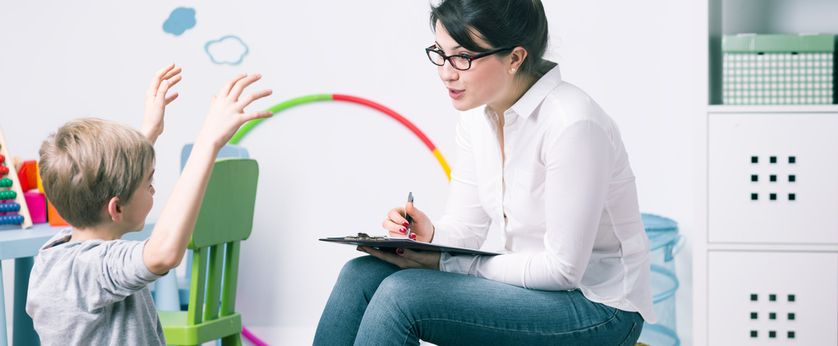
Updated on April 27, 2021
School Psychology is a psychology subspecialty that integrates psychological theory with educational practice in order to define and treat educational problems and mental health needs of children in classrooms. School psychologists must work collaboratively with teachers and other education professionals.
Teachers need to be aware of what is going on in a student’s life to best reach them in an educational context, which is why consultations with a school psychologist is so important and why school psychologists play such a vital support role on the student’s team. As trained counseling professionals, school psychologists are able to enlighten educators and work one-on-one as an advocate for the student.
Sponsored School(s)
What Does a School Psychologist Do?
On the Surface
School psychologists offer support to the emotional and educational needs of a student, but cannot optimize their performance without engaging others in the child’s universe. Parents, administrators, and teachers are all an active part of supporting the child. The school psychologist enables these individuals to approach a student mentally and physically to provide the best possible learning environment.
These professionals design training plans and schedules around the behavioral science of a child. They monitor the progress of the student and train educators to watch out for particular behavioral concerns and how to mange them.
 They assess a student’s progress through the full span of the student’s educational career and they also aide teachers, administrators and parents as needed.
They assess a student’s progress through the full span of the student’s educational career and they also aide teachers, administrators and parents as needed.
Deep Dive
School counselors offer a wide variety of services to students, including emotional support, scheduling/educational guidance as it relates to high school and post-secondary plans, parental and family counseling, and assisting administration with mandated testing efforts.
Unlike high school teachers, who may have only 30 students per class (less than 200 throughout the day at the secondary level), the New York Times reports that the ratio of students to guidance counselors is around 500 to 1. That means a high school counselor can get tugged in a lot of different directions.
 As a rule, the “typical day” of a school psychologist isn’t typical at all. As Tawnya Pringle of Hoover High School in San Diego tells U.S. News and World Report, “You can have a student walk into your office and they could be homeless” or they could be dealing with student stress over parental expectations.
As a rule, the “typical day” of a school psychologist isn’t typical at all. As Tawnya Pringle of Hoover High School in San Diego tells U.S. News and World Report, “You can have a student walk into your office and they could be homeless” or they could be dealing with student stress over parental expectations.
Other times, she noted, “I’ve had a lot of parents come in over the years that just have said, ‘I don’t know what to do. How do I handle when my teenager is doing this, this and this at home?'”
Parents are seldom in the position to understand these changes in as much depth as a school psychologist.
School psychologists must be able to provide support, but also know when deeper issues require more intensive therapy. “Sometimes there’s a myth that we do therapy in schools and that’s not it,” Pringle said. “School counselors are trained to be the front line in terms of assessing what the issues are in a child’s life, but if they feel something more in-depth is going on they’ll refer the student to a therapist.”
For other duties or tasks that a high school counselor may end up taking on, professional guidance counselor Cynthia Ward Hemminger writes in a Quora post that many counselors mail transcripts, confirm if a student qualifies for a fee waiver, compile and send profiles of the high school and send other documentation as required by the university that a student plans to attend.
Furthermore, “a counselor who is really on top of things,” Hemminger notes, will also “make sure you meet all deadlines by encouraging you to get a good start on your testing/essays, etc. no later than spring of your junior year; help you research to make out a list of schools to which you should apply, making sure that a reach school and a safety school are included; recommend methods for improving grades or test scores as needed; and even proofread application essays.”
Professional Interview: A Q&A with Dr. Frank C. Worrell, Professor of School Psychology
 Dr. Frank C. Worrell is a Professor of School Psychology in the Graduate School of Education at the University of California, Berkeley, and an affiliate Professor in Personality and Social Psychology in the Psychology Department at UC Berkeley.
Dr. Frank C. Worrell is a Professor of School Psychology in the Graduate School of Education at the University of California, Berkeley, and an affiliate Professor in Personality and Social Psychology in the Psychology Department at UC Berkeley.
He has served on the editorial boards of several journals including serving as co-Editor/Editor of Review of Educational Research from 2012 to 2016. He has also served on committees of the American Psychological Association (APA) and as a Member at Large on the APA Board of Directors. Dr. Worrell is currently the 2021 President-Elect of the APA.
How did you become interested in school psychology?
My original goal actually was to be a secondary school teacher, in english specifically because it was my favorite subject, but in my last year of secondary school we were at a school concert and a student kind of went a little berserk. He lost it on stage and started cursing and I was fascinated. I thought, well, if I’m going to be a teacher, it may make sense to take some psychology courses so I can understand the stresses students are under.
So, I started off as an english major and a psychology minor. I figured I would take a few psych courses that would be useful to me as a teacher, but I fell in love with psychology as a subject and by the end I became a psychology major and an english minor.
I had to do an honor’s thesis for my major and conduct research and I was surprised to find that I did really well and I really enjoyed it. I didn’t get the results I wanted, but my undergraduate institution gave me a scholarship to do my master’s degree because I had done so well.
I did more research as a master’s student and even though it wasn’t something that I’d ever thought about, I was really good at it and found it really gratifying so I decided to continue with my education. Since I had done my master’s in educational psychology, I was going to apply to do my PhD in educational psychology as well. I mentioned it to my best friend from secondary school who was pursuing his law degree at UC Berkeley at the time, and he sent me the catalog.
As I was going through their catalog he was trying to convince me to apply to Berkeley because they had an Ed Psych program, but then I came across school psychology.
What's the difference between educational psychology and school psychology?
Right, well, this is a U.S. distinction. In the rest of the world, they don’t typically have this, but in the U.S. educational psychologists are trained as researchers, so they only do research.
School psychologists, on the other hand, get all that educational psychology research training, but there is also a clinical psychology component. So, you’ve got both the research and the clinical training.
How can a school psychologist use this training to help schools develop effective programs for their students?
That’s a really important question actually. One of the things I try to talk about is that psychology is about individual differences. We each have different strengths and part of the educational process is to help students maximize their strengths so that they enter life with a broader range of possibilities.
This is how schools need to frame all of these programs. So, the student who’s in the math club or in the accelerated math class is just like the student who is on the competitive football team or in the chess club, right? We celebrate when the sports teams do well and we should have that same celebration for the academic achievements. We should give it the same sort of presence.
My idea for schools, and I’ve given this advice to low-income school districts, is to encourage students to follow their passion and to start doing this from kindergarten. There’s no reason why you can’t have once-a-month “Fun Fridays” where students can explore new subjects and ideas long before they might qualify for a gifted and talented or accelerated education program.
Bring in parents and have teachers who do music, painting, chess and so forth with the students. You may have some students doing math and others studying history. And what happens is that you normalize the individual differences and celebrate them right from the start.
We need to help students find the things that they are good at in both the academic and nonacademic realms, and this will also keep them motivated and interested. For myself, I was not the most diligent student in school, but music programs kept me motivated and involved.
You can read the rest of our interview with Dr. Worrell here.
6 Steps to Becoming a School Psychologist
No matter what state you reside in, the school psychologist is at the very least expected to carry a master’s degree. Most states are moving to a doctorate degree requirement and they also require the guidance counselor or school psychologist to pass certification exams.
For example, becoming a licensed educational psychologist in California would require you to complete “at minimum” a master’s degree in psychology, educational psychology, school psychology, counseling and guidance, or a degree deemed equivalent by the Board. This degree must be obtained at a university accredited by one of six U.S.-based accrediting bodies. Interested parties can find out more at the Board of Behavioral Services (BBS) website.
The BBS also delves into necessary experience requirements and prepping for the LEP Written Examination. Candidates outside the state of California can check with their states’ licensing boards for specific requirements.
A minimum standard would look like this:
1Select a college or university
2Complete an undergraduate degree
3Complete a master’s degree
4If your state requires it, continue working toward doctorate degree (i.e. PhD, Doctor of Psychology, Doctor of Education, etc.)
5Fulfill additional experience requirements as recommended by the university’s graduate program
6Pass licensing exam

Skills Required to Become a School Psychologist
While there are many skills necessary to becoming a successful school psychologist, above all, school psychologists must be good listeners and possess the ability to connect parents, students, and teachers with the resources they need to accomplish the number one goal of public education — providing a safe and effective learning environment.
Other “musts” for potential school psychologists include…
1must have a certain temperament as well as specialized knowledge and training when meeting the various demands of the job
2must be able to offer emotional support while maintaining a safe and ethical relationship with students and their parents
3must be able to accommodate administrative requests, so attention to detail and knowledge of relevant laws and policies are crucial
4must be able to bridge the gap of understanding for students between the secondary and post-secondary education worlds
5must have patience and empathy for parents and students as they struggle through the various stages of child development
6must be able to guide students toward scholarship and financial aid opportunities for continuing their education past high school
Degree Options
1
Bachelor’s
Degree
A B.A. is a requirement to enter the field of school psychology. Since most end up working in the public education system, a popular major is education, enabling many guidance counselors to develop classroom experience. This experience can prove valuable as counselors must have a strong understanding of teachers, parents and students if they are to nurture a child’s education and give them the best chance to succeed.
2
Master’s
Degree
A master’s degree can generally take two to three years to complete. School psychology programs are usually listed in course catalogs as School Psychology or Educational Psychology.
3
Doctorate
The doctorate degree for school psychology is most often referred to as Educational Specialist (or Ed.S). The program can take four years to complete, as in the case of Ball State’s Educational Psychology program. During that time, “you’ll work closely with faculty who are leading experts in their field,” Ball State’s site notes, with the possibility to work not only in schools but also private practice, mental health, hospitals or academic settings.
School Psychology Salaries: State by State
Nationwide averages show those with a school psychology degree can earn $60,000 or more, depending on credentials and place of employment. Most every school district in the country offers the availability of a school counselor to their students. Larger districts employ multiple school counselors. In the field of school psychology, opportunities are at their most plentiful. Even in areas of the country where psychology is a poor job market, you can usually find jobs for the school psychologist.
If wishing to work in this area, guidance counselor is the most commonly open position. Other school psychologists may go on to get their teaching certificate. Some may even wish to go into school administration. At all levels, their skills and services are necessary in providing students with a safe and healthy environment best equipped for the performance of the child.
According to the Bureau of Labor Statistics (BLS), the salary of a school psychologist clocks in at an annual mean wage of $89,000. The degree also offers access to positions in hospitals and child day care services that report annual mean wages of $82,000 and $96,000, respectively. On the low end of the scale, school psychologists may earn just north of $46,000 per year, while on the high end (the 90th percentile and above), they could earn as much as $138,000 per year.
Job Growth and Career Trends
An overwhelming majority of jobs in the field — 43,880 out of close to 74,000 (almost 60%) — are in elementary and secondary schools.
The BLS expects that 26,800 new school psychologist jobs will be added between 2019 and 2029, at an employment growth rate of 8 percent.
“Part of that expansion comes from an increasing need for schools to assist students with learning disabilities, special needs and behavioral issues,” adds U.S. News and World Report.
Useful School Psychology Resources
Browse All School Psychology Programs
SaveSave








 Degrees Offered
Degrees Offered














